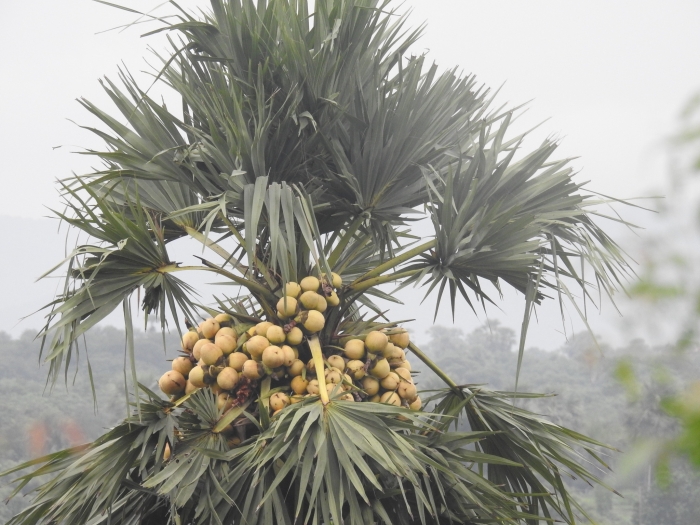Toddy Palm
(Borassus flabellifer)
Toddy Palm (Borassus flabellifer)
/
/

Raja bandi
CC BY 4.0
Image By:
Raja bandi
Recorded By:
Copyright:
CC BY 4.0
Copyright Notice:
Photo by: Raja bandi | License Type: CC BY 4.0 | License URL: http://creativecommons.org/licenses/by/4.0/ | Rights Holder: Raja bandi | Publisher: iNaturalist | Date Created: 2021-07-14T06:55:13-07:00 |























Estimated Native Range
Summary
Borassus flabellifer, commonly known as Toddy Palm, is an evergreen tree native to the arid, semi-arid, and humid tropical regions of South and Southeast Asia, as well as Indonesia. It is a robust species that can reach a height of 30 meters (98 ft), with a sturdy grey trunk ringed with leaf scars. Old leaves remain attached to the trunk for several years before falling off. The fan-shaped leaves are 3 meters (9.8 ft) long, with distinctive black teeth along the petiole margins. Male flowers are small, less than 1 cm long, and form semi-circular clusters hidden beneath scale-like bracts within the catkin-like inflorescences. Female flowers are much larger, golfball-sized, and solitary, sitting on the surface of the inflorescence axis. After pollination, these flowers develop into large, fleshy fruits 15–25 cm wide, each containing 1-3 seeds. The fruits are black to brown with sweet, fibrous pulp, and each seed is enclosed within a woody endocarp.
Toddy Palm is valued for its ornamental qualities, including its impressive size and clean growth habit. It is cultivated in gardens and parks as a landscape palm species. The tree is also known for its utility, as the sap can be tapped to make palm wine, and the fruits are edible. In cultivation, it thrives in full sun and requires medium amounts of water, adaptable to a range of soil drainage conditions from slow to fast. It is important to note that young palmyra seedlings grow slowly and require patience before they rapidly increase in size and produce a substantial stem. Potential problems include leaf spot and fruit rot, which can occur in humid climates.CC BY-SA 4.0
Toddy Palm is valued for its ornamental qualities, including its impressive size and clean growth habit. It is cultivated in gardens and parks as a landscape palm species. The tree is also known for its utility, as the sap can be tapped to make palm wine, and the fruits are edible. In cultivation, it thrives in full sun and requires medium amounts of water, adaptable to a range of soil drainage conditions from slow to fast. It is important to note that young palmyra seedlings grow slowly and require patience before they rapidly increase in size and produce a substantial stem. Potential problems include leaf spot and fruit rot, which can occur in humid climates.CC BY-SA 4.0
Plant Description
- Plant Type: Tree
- Height: 40-60 feet
- Width: 18-25 feet
- Growth Rate: Moderate
- Flower Color: Cream, White
- Flowering Season: Summer
- Leaf Retention: Evergreen
Growth Requirements
- Sun: Full Sun
- Water: Medium
- Drainage: Fast, Medium, Slow
Common Uses
Bird Garden, Drought Tolerant, Edible*Disclaimer: Easyscape's listed plant edibility is for informational use. Always verify the safety and proper identification of any plant before consumption.
Natural Habitat
Native to arid, semi-arid, and humid tropical regions of South and Southeast Asia, and Indonesia
Other Names
Common Names: Palmyra Palm , Wine Palm , Ice Apple , Tala Palm , Doub Palm , Lontaro , Palmyrapalme , Palma Palmira , Boraso , Borasse
Scientific Names: Borassus flabellifer , Borassus flabelliformis , Borassus sundaicus , Borassus tunicatus , Lontarus domestica , Pholidocarpus tunicatus , Thrinax tunicata
GBIF Accepted Name: Borassus flabellifer L.